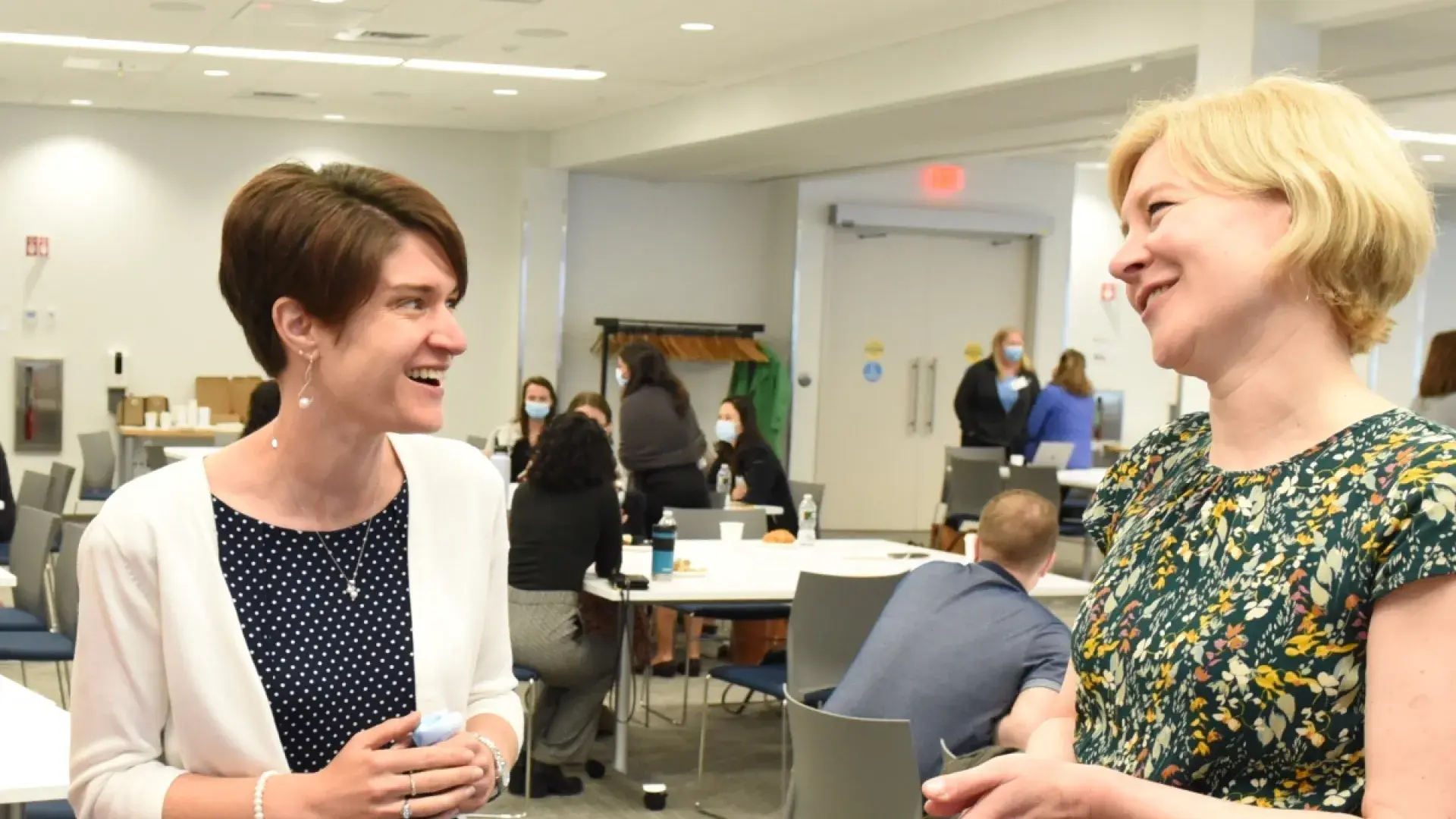
Program looks to reverse long-time misconceptions by promoting social justice and anti-oppressive care while diversifying the profession.
The field of genetic counseling, for many, can be unknown, misunderstood, unavailable, and distrusted for myriad reasons. Trying to reverse those conditions is where the MGH Institute’s Department of Genetic Counseling is focusing much of its attention in educating students.
“It’s been moving in a direction to recognize that social justice and anti-oppressive care should be at the forefront of everything we do in our profession,” said Maureen Flynn, the department’s chair. “It requires a complete integration into how we practice.”
Since the program’s inception, the department has consciously incorporated those topics throughout the curriculum. In recent years, that has meant working with the Institute’s Office of Justice, Equity, Diversity, and Inclusion (JEDI), specifically with Callie Watkins Liu, director of JEDI education and programming. According to Ann Seman, an assistant professor of genetic counseling and the program’s director of clinical education, it’s meant exposing students to an overarching framework of important topics, such as cultural humility and critical race theory.
And that exposure goes beyond the classroom. It’s not uncommon for IHP students to have a better understanding of racial inequalities as they relate to genetic counseling, Seman said. That means students may provide context to their clinical supervisors.
“We are seeing an increase in diversity of our students, but that's not yet reflected in the genetic counselors who are in the field,” she said. “So, it can be difficult to pair historically marginalized students with supervisors who are of the same race or ethnicity, plus many white genetic counselors don't always know how to address their student if they're of a different race or ethnicity to learn more about them and how they can best support them to create a sense of belonging.”
Acknowledging past and present eugenics practices is important to the field of genetic counseling. Starting in the early 20th century, the United States sanctioned the sterilization of racial and ethnic minorities as well as those with disabilities. More than 64,000 individuals were forcibly sterilized under eugenic legislation in the United States from 1907 - 1964, leading many to understandably regard genetics with a skepticism that continues today.
There are other barriers to genetic counseling being widely available to a diverse cross-section of the population, Seman said. They include the low number of counselors outside large urban areas. Then there’s the insurance issue.
“It's definitely an accessibility issue of who can actually get to an institution where genetics and genetic counseling is offered, and if so, can they even get an appointment?” she said. “And can they have genetic testing that's recommended because insurance doesn't necessarily cover genetic testing, it can be very expensive.”
Many people are wary of “Big Data,” their concern being that their genetic information will be illegally shared and used in ways in which they don’t authorize.
“I think there's definitely a lack of trust in knowing how their genetic information is going to be used,” Seman noted. “I think many have that fear, though. We're learning a lot more about genetic privacy and what your genetic information can be used for, especially with direct-to-consumer testing. A lot of clinical labs hold on to data and they might use that to help develop future tests or use it as controls and so you really have to read the fine print when you do the testing. And that really comes down to the genetic counselor who's consenting the patient for the testing so that they are aware of what those different caveats are.”
Prenatal counseling also includes gender identification which has become a hot-button subject in much of the country.
“Not all patients in the reproductive setting are female. They could be transgender or nonbinary, so trying to be inclusive with the language you're using when you're talking about the individual who is pregnant and their partner and not being so focused on gender is very important,” cautioned Seman. “There's testing that can be done to identify the sex at birth of the child, but that doesn't necessarily mean that's how the child will eventually identify, or they could end up having a condition that doesn't match their sex chromosomes.”
Cancer diagnoses have similar language issues.
“Someone who is a transgender male still has “female” reproductive parts, so there's a risk for what has always been termed ‘female cancers’,” explained Seman. “It's trying to use the language to focus more on what's the organ, like breast cancer and ovarian cancer, rather than seeing them as ‘female cancers’. It’s just basic cultural humility and knowing what questions to ask and how to meet your patient and really make it a patient-centered approach.”
While the IHP program focuses on developing the next generation of genetic counselors, its yearly conferences have brought together some of the best minds in the field for wide-ranging discussions. Empowerment: An Anti-Oppressive Approach to Genetic Counseling, held this past June, attracted more than 100 counselors, IHP faculty, and students looking to improve how they practice. Presentations included “Leading Through Empowering Listening,” “Addressing Race and Ethnicity in Supervision and Promoting Belonging in the Clinical Environment,” “From Disability to Militarism: A Global and Intersectional Analysis,” and “Now What? Reflections on the Actionability of an Anti-oppressive Approach to Genetic Counseling.”
“Individuals who are not white, cisgender, heterosexuals don't necessarily feel included or welcome in the genetic counseling profession because it’s predominantly white,” said Seman. “So, we like to focus on social justice and anti-oppressive topics. We would like to diversify the profession, which will improve services to all populations.”
Do you have a story the Office of Strategic Communications should know about? If so, email ihposc [at] mghihp.edu (ihposc[at]mghihp[dot]edu).
